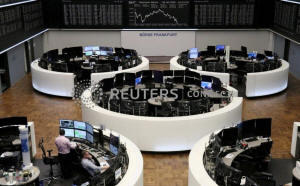Europe stalls after China's bull charge rumbles on
 Send a link to a friend
Send a link to a friend
 [July 07, 2020]
By Marc Jones [July 07, 2020]
By Marc Jones
LONDON (Reuters) - A five-day charge by
world stocks fizzled on Tuesday as caution about renewed coronavirus
lockdowns took hold again, though it was not enough to completely douse
China's July hot streak.
London, Paris and Frankfurt were down around 1% in early trading as the
bumpier conditions shifted investors back to the dollar and the region's
government bonds.
Tokyo, Hong Kong and Seoul had all lost ground in Asian trading, while
Shanghai's high-flying blue-chip index was sputtering by the close after
adding to the 15% gains it has made over the last week.
"Just when many parts of the world looked to have got to grips with the
coronavirus pandemic, many jurisdictions re-imposed lockdowns to contain
a surge in new cases," said chief strategist at Pictet Asset Management
Luca Paolini.

He said corporate earnings prospects were clearly a concern. The
consensus is that profits globally will decline by about 20% percent
this year following the deepest recession in more than a century,
although Pictet is predicting a 30% to 40% slump.
"But that does not mean equity and corporate bond markets are due a
sharp fall," Paolini said, predicting the U.S. Federal Reserve will
inject another $1.3 trillion of stimulus this year and the ECB will add
an extra 1.1 trillion euros.
Analysts said signals from the Chinese government through a
state-sponsored journal on the importance of "fostering a healthy bull
market" published on Monday had helped the buying recent binge in
Chinese shares.
The current China rally has echoes of the past, especially during 2007
and in the buying spree that followed the crash in 2015 that was largely
driven by Chinese retail investors.
"Shades of John F. Kennedy's 'Ask not what your country can do for you'
inauguration speech here and as close as you might get to a Chinese
government 'put' as anything the Fed has done to date vis-à-vis the U.S.
stock (and credit) markets," said Ray Attrill, head of FX strategy at
NAB, in a research note.
A sharp rebound in U.S. services industry activity in June, almost
returning to pre-pandemic levels, also helped to whet investors' risk
appetite.

DEMAND DESTRUCTION
New coronavirus cases surged in several states, however, forcing some
restaurants and bars to close again in a setback to the budding recovery
that helped check gains in risk assets.
[to top of second column]
|

The German share price index DAX graph is pictured at the stock
exchange in Frankfurt, Germany, June 26, 2020. REUTERS/Staff/File
Photo

Lockdown measures were reimposed in Australia's second biggest city
Melbourne on Tuesday too, confining its residents to all but
essential travel for another six weeks.
In the currency market, the Chinese yuan edged to its highest levels
in nearly four months. The renminbi rose 0.1% to 7.0115 per dollar
though it was small scale compared to Monday's near 1% jump.
"The yuan is supported by the risk-on mood in the Chinese share
market despite lingering uncertainties over the U.S.-China relations
and an anticipated slow pace of recovery," said Ei Kaku, senior
strategist at Nomura Securities.
Other major currencies were struggling as the dollar regained
traction. The yen was flat at 107.41 to the dollar, the euro slipped
back under $1.13 and all the way to $1.1275, while the Aussie dollar
dropped 0.5% after headlines of Melbourne's lockdown measures
broke..
Gold dipped slightly in metals, but was still a near an eight-year
peak at $1776 per ounce. Copper was a touch weaker in London trading
too, having hit a fresh five-month high as part of the China charge
in Asia.
Oil prices were also struggling in line with most commodity markets.
Brent crude lost nearly 1% to $42.69 per barrel, while U.S. West
Texas Intermediate crude fell to $40.24.

With 16 U.S. states reporting record increases in new COVID-19 case
in the first five days of July, according to a Reuters tally, there
is renewed concern about demand for fuel in the world's biggest
oil-consuming country.
Florida is reintroducing some limits on economic reopenings to
grapple with rising cases. California and Texas, two of the most
populous and economically crucial U.S. states, are also reporting
high infection rates.
"The potential for demand destruction as lockdown reinstatement
looks more likely are combining with concerns about OPEC+ discipline
to weigh on oil prices," said CMC Markets's Chief Market Strategist
Michael McCarthy in Sydney in an email.
(Reporting by Marc Jones; Editing by Catherine Evans)
[© 2020 Thomson Reuters. All rights
reserved.] Copyright 2020 Reuters. All rights reserved. This material may not be published,
broadcast, rewritten or redistributed.
Thompson Reuters is solely responsible for this content. |